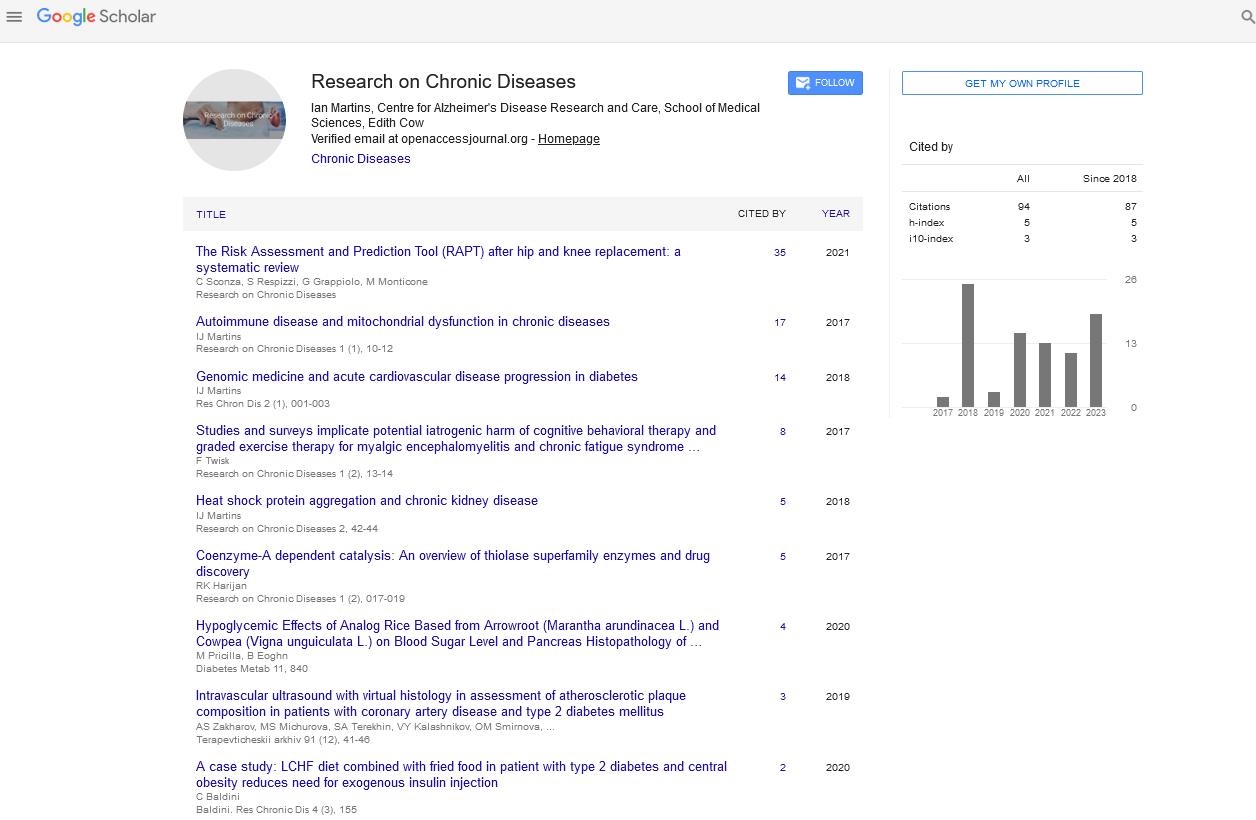Perspective - Research on Chronic Diseases (2024) Volume 8, Issue 3
Breaking Free: Understanding Addiction, Embracing Recovery, and Building a Brighter Future
- Corresponding Author:
- Gebreegziabher Hailay
Department of Pathophysiology,
Lebanon university,
Sidon,
Lebanon
E-mail: gere32410@gmail.com
Received: 04-May-2024, Manuscript No. oarcd-24-134056; Editor assigned: 08-May-2024, PreQC No. oarcd-24-134056 (PQ); Reviewed: 22-May-2024, QC No. oarcd-24-134056; Revised: 07-Jun-2024, Manuscript No. oarcd-24-134056 (R); Published: 14-Jun-2024, DOI: 10.37532/OARCD.2024.8(3).192-193
Introduction
Addiction, a pervasive and complex phenomenon, casts a shadow over the lives of millions, ensnaring individuals in a relentless cycle of dependence, craving and despair. Defined as a chronic, relapsing disorder characterized by compulsive drug-seeking and use despite adverse consequences, addiction exerts a profound impact on physical health, mental well-being, social relationships and overall quality of life. From the grip of substance abuse to the clutches of behavioral compulsions, addiction manifests in myriad forms, transcending boundaries of age, gender, socioeconomic status and cultural background. In this article, we embark on a journey through the labyrinth of addiction, exploring its underlying mechanisms, risk factors, consequences, treatment modalities and pathways to recovery and redemption.
Description
Understanding addiction
Addiction is a multifaceted and multifactorial phenomenon stemming from a complex interplay of genetic, environmental and psychological factors. At its core, addiction involves dysregulation of the brain’s reward circuitry, leading to heightened sensitivity to drugs or behaviors that trigger feelings of pleasure and euphoria. Over time, repeated exposure to addictive substances or behaviors rewires neural pathways, reinforcing maladaptive patterns of behavior and diminishing the individual’s ability to exert control over their impulses. As addiction progresses, tolerance develops, requiring higher doses of the substance or engagement in the behavior to achieve the desired effect, further fueling the cycle of dependency and craving.
Types of addiction
Addiction can manifest in various forms, encompassing substance-related disorders such as alcoholism, opioid addiction, stimulant abuse and nicotine dependence, as well as behavioral addictions such as gambling disorder, internet addiction, gaming addiction and compulsive overeating. While the specific substances or behaviors may differ, the underlying mechanisms of addiction share commonalities, including the activation of reward pathways in the brain, the development of tolerance and withdrawal symptoms and the compulsive nature of drug-seeking and use.
Risk factors and vulnerability
Numerous factors contribute to an individual’s vulnerability to addiction, including genetic predisposition, early life experiences, trauma, mental health disorders, peer influence, socioeconomic factors and environmental stressors. Genetic variations in neurotransmitter systems, such as dopamine, serotonin and opioid receptors, can influence susceptibility to addiction by modulating reward sensitivity, impulse control and stress response mechanisms. Adverse childhood experiences, including neglect, abuse and household dysfunction, can predispose individuals to maladaptive coping strategies and substance use as a means of self-medication. Additionally, social and environmental factors such as poverty, unemployment, peer pressure and availability of addictive substances play significant roles in shaping patterns of substance abuse and addiction.
Consequences of addiction
The consequences of addiction extend far beyond the individual, impacting families, communities and society at large. Chronic substance abuse can lead to a myriad of physical health problems, including liver disease, cardiovascular complications, respiratory disorders, infectious diseases and neurological impairments. Mental health disorders such as depression, anxiety and psychosis often co-occur with addiction, exacerbating symptoms and complicating treatment. Social consequences of addiction may include strained relationships, legal problems, financial hardship, unemployment, homelessness and social isolation. Moreover, the societal costs of addiction, including healthcare expenditures, criminal justice involvement, lost productivity and human suffering, are staggering, underscoring the urgent need for effective prevention and intervention efforts.
Treatment modalities
The treatment of addiction requires a comprehensive and individualized approach that addresses the complex interplay of biological, psychological, social and environmental factors contributing to the disorder. Detoxification, the process of safely withdrawing from addictive substances under medical supervision, may be necessary to manage withdrawal symptoms and stabilize the individual’s condition. Behavioral therapies, such as Cognitive-Behavioral Therapy (CBT), motivational interviewing, contingency management, and relapse prevention techniques, help individuals identify and modify maladaptive thought patterns and behaviors associated with addiction. Medication-Assisted Treatment (MAT) may be employed to reduce cravings, alleviate withdrawal symptoms and facilitate recovery in individuals with opioid or alcohol use disorders. Peer support groups, such as Alcoholics Anonymous (AA), Narcotics Anonymous (NA) and SMART Recovery, provide invaluable social support, encouragement and accountability for individuals in recovery.
Pathways to recovery and redemption
Recovery from addiction is a deeply personal and transformative journey marked by courage, resilience and self-discovery. While the road to recovery may be fraught with challenges and setbacks, every step forward represents a triumph of the human spirit over adversity. Embracing recovery entails a commitment to selfreflection, self-awareness and personal growth, as individuals confront the underlying issues driving their addiction, cultivate healthy coping mechanisms and rebuild their lives with purpose and meaning. Building a strong support network of family, friends, peers and healthcare providers is essential in providing encouragement, guidance and accountability along the journey. Moreover, embracing a holistic approach to wellness, including physical exercise, mindfulness practices, creative expression and community involvement, can foster resilience, promote self-care and enhance overall well-being in recovery.
Conclusion
Addiction, a formidable adversary that knows no bounds, exacts a heavy toll on individuals, families and society at large, perpetuating cycles of suffering and despair. By gaining a deeper understanding of its underlying mechanisms, risk factors, consequences and treatment modalities, we can better equip ourselves to combat the scourge of addiction and support individuals on their journey to recovery and redemption. Together, let us stand united in our commitment to raising awareness, reducing stigma and building a brighter future where compassion, empathy and support prevail over the darkness of addiction.
